
July 19
1870 Franco-Prussian War: France declares war on Prussia. Note: This is a pivotal event in German history, as Prussia will emerge as the single strongest European state and the catalyst for German Unification under Bismarck.
The underlying causes of the conflict were the determination of Bismarck to unify Germany under Prussian control and, as a step toward this goal, to eliminate French influence. Napoleon III, emperor of France from 1852 to 1870, sought to regain both in France and abroad the prestige lost as a result of numerous diplomatic reverses, particularly those suffered at the hands of Prussia in the Austro-Prussian War of 1866. In addition, the military strength of Prussia, as revealed in the war with Austria, constituted a threat to French dominance on the continent of Europe.
The event directly precipitating the Franco-Prussian War was the candidacy of Leopold, prince of Hohenzollern-Sigmaringen, for the throne of Spain, rendered vacant by the Spanish revolution of 1868. The French government, alarmed at the possibility of a Prusso-Spanish alliance resulting from the occupancy of the Spanish throne by a member of the Hohenzollern dynastic family, threatened Prussia with war if Leopold's candidacy was not withdrawn. The French ambassador to the Prussian court, Comte Vincente Benedetti, was dispatched to Ems, a spa in northwestern Germany being visited by [Wilhelm] I, king of Prussia. Benedetti had been instructed to demand that the Prussian monarch order Prince Leopold to withdraw his candidacy. [Wilhelm], although angered, gave Benedetti permission to communicate directly with Leopold by telegraph. Leopold could not be reached, but his father wired a retraction of the candidacy in the name of his son.
The government of Napoleon III, still not content, was determined to humiliate Prussia, even at the cost of war. [The] French foreign minister demanded that [Wilhelm] submit a personal letter of apology to Napoleon III and a guarantee that the Hohenzollern candidacy would never be renewed. In an interview at Ems, the Prussian king rejected the French demands. The same day, Bismarck obtained [Wilhelm's] authorization to publish the French demands and the Prussian rejection contained in what was known as the Ems Dispatch. Bismarck edited the document in a manner calculated to aggravate the resentment of the French and the Germans. The Prussian statesman realized that this move would in all probability precipitate war, but he knew that Prussia was prepared, and he counted on the psychological effect of a French declaration of war to rally the south German states to Prussia's cause, thus accomplishing the final phase in the unification of Germany.
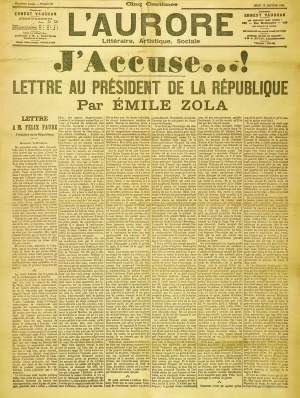
1898 Dreyfus affair: Emile Zola flees France: Novelist Emile Zola flees France on this day in 1898 to escape imprisonment after being convicted of libel against the French army in the notorious Dreyfus affair . . . .
In 1898, Zola wrote an inflammatory newspaper letter, entitled "J'Accuse," exposing a military cover-up regarding Captain Alfred Dreyfus. Dreyfus, a French army captain, had been accused of espionage in 1894 and sentenced in a secret military court-martial to imprisonment in a South American penal colony. Two years later, evidence of Dreyfus' innocence surfaced, but the army suppressed the information. Zola's letter blamed the military for concealing its mistaken conviction.
Zola's letter provoked national outrage on both sides of the issue, among political parties, religious organizations, and others. He was brought to trial for libel, convicted, and sentenced to one year's imprisonment. He fled France but returned in 1899, after Dreyfus was pardoned. Zola died in 1902, four years before Dreyfus was finally exonerated.
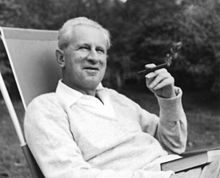
1898 Birth: Herbert Marcuse: German-American philosopher and sociologist of Jewish descent, member of the Frankfurt School. Herbert Marcuse was born in Berlin to a Jewish family, served in the German Army caring for horses in Berlin during the First World War. He then became a member of a Soldiers' Council that participated in the aborted socialist Spartacist uprising, which was ultimately crushed by the forces of the Weimar Republic. During World War II Marcuse first worked for the U.S. Office of War Information (OWI) on anti-Nazi propaganda projects. In 1943 he transferred to the Office of Strategic Services (OSS). His work for the OSS involved research on Nazi Germany and denazification. After the dissolution of the OSS in 1945, Marcuse was employed by the US Department of State until 1951 as head of the Central European bureau, retiring after the death of his wife.
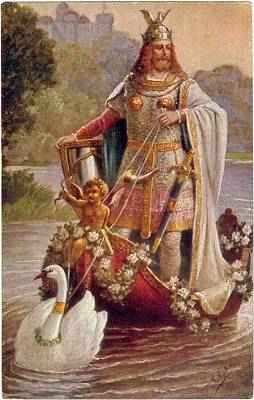
1908 Vienna days: Hitler spends the evening enjoying a performance of Wagner's Lohengrin at the Vienna Opera House. [For further details, Click here.]
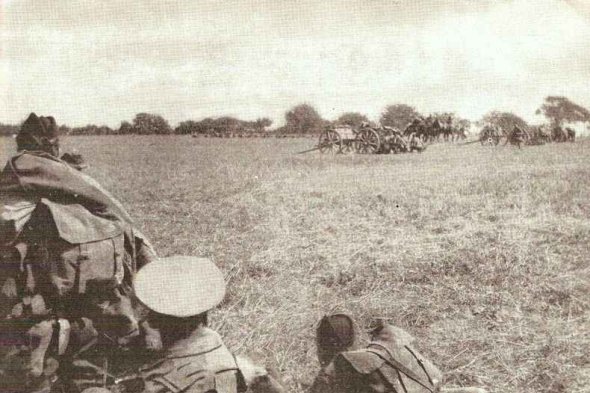
1915 World War I: List Regiment: Gefreiter Adolf Hitler's 16 Reserve Infantry Regiment continues to occupy a position at Fromelles, on a level field with water channels, willow trees and willow stalks. In the distance towards the enemy lines lies an insignificant wood with barbed wire entanglements. Under the direction of their defense-minded commander, Lieutenant General Gustav Scanzoni von Lichtenfels, the regiment works ceaselessly day and night to further fortify their position at Fromelles while fighting off repeated assaults by the enemy. [For further details, Click here.]
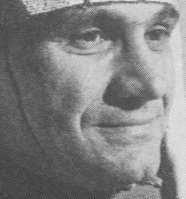
1916 List Regiment July 19-20: From their fortified position, known as "the sugarloaf," the 16th RIR bears the brunt of an Allied offensive. Regimental adjutant Captain Frederick 'Fritz' Wiedemann [above] will write that the artillery bombardment began at 9:00 AM and "brought the trenches and hinterland under increasingly strong fire."
At 1:45 PM this took on the distinct character of a barrage, from the right and left flanks as well as the Front, fire came from heavy and medium mortars. The fire from the English artillery and mortars abated temporarily, only to swell by fits and starts to greater violence . . . . At 5 PM Englishmen reported [as being] in front of the Australian position were immediately brought under fire . . . . The [dispatch runners] came back reporting our trenches under the heaviest barrage, losses considerable and the damage to the position severe.
Hitler's fellow dispatch runner, Balthaser Brandmayer, will later write: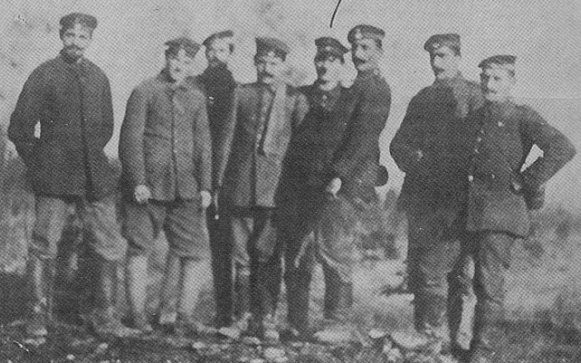
Hitler and his fellow dispatch runners
[The runners] carried message after message from and to the trenches. Glaring flares lit our way. The Australians stormed for the fifth time vainly across the battlefield. Those who escaped the rain of bullets from our machine-guns, found certain death in the hurricane of the German artillery fire . . . . I dashed with Hitler to the battle HQ of the 17th Regiment. He scarcely gave me time to get my breath back [before] we ran on to 21st Regiment. Grenades chased us through the darkness of the night; we rolled in time with them into a water-filled mine crater. The light of a high-flying flare first gave us an instance of orientation again. "Now push on!" said Hitler and we scrambled up the crater wall. Wet through to above the chest our trousers and shirts stuck to our bodies. And how we froze! The envelope and paper we handed the regimental commander were soggy. He was scarcely able to decipher the report.
This action proves to be the List Regiment's proudest single action of the war, and the worst defeat in Australia's short combat history. Launched as a diversion to discourage the Germans from reinforcing their troops during the Battle of the Somme, the result is a massacre of the 15th Australian brigade. From the Imperial War Graves Commission:The Australian left and center of the 5th Division reached the German trenches and held their second line during the day and night, but the right was held off by a fierce machine-gun barrage and only reached the Frontline in isolated groups. The action was broken off in the morning of the 20th, after the 5th Australian Division had lost over 5,000 [5,553: 1,917 killed, 3,146 wounded, and 470 taken prisoner] officers and men.
From the official Bavarian history: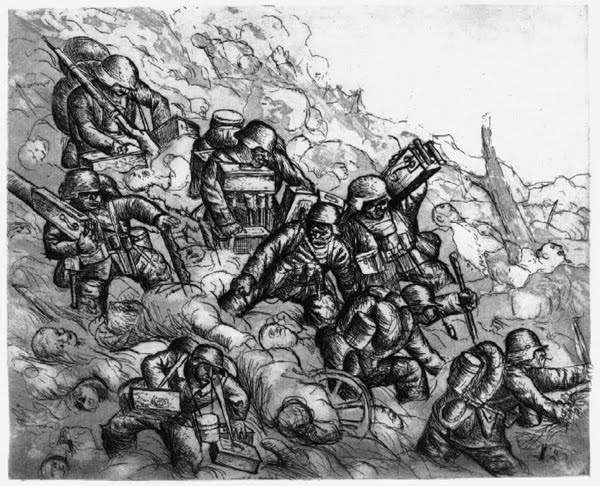
Since the beginning of the great battle of the Somme and even earlier, the enemy had endeavored to divert attention and strength on the German side again and again in other directions. So it was to the west of Lille near Fromelles, where the 6th BRD . . . lay, and where from mid-June on it became ever livelier. On 19 July at 12:30 PM a barrage of cannon fire and mortars was laid down [in] the sector occupied by the 21st, 16th and 17th RIRs . . . . But the batteries of the 6th BRD, for which the overwhelming English superiority in guns and aircraft made it certainly difficult to cope, in spite of this didn't hesitate to pour demoralizing fire into the English position, where English storm troops were assembled . . . .
So the English attack, which finally left the trenches at 6:30 PM, had already had its backbone broken. In cold blood and filled with jubilation, the men of the 16th RIR awaited [the] English attack and struck it down bloodily . . . . In effect, the strength of the three regiments . . . succeeded by the early morning of 20 July in gradually freeing their position of English troops, massacring them or cutting them off. The booty included 500 prisoners and 20 machine guns. The 6th BRD can glory [in the fact] that without help it had frustrated the intentions of the enemy. [For further details, Click here.]
1917 World War I: Various:
Eastern Front: General Max Hoffmann begins a new German assault, crushing the demoralized Russian armies. The Germans halt their advance at the Galician border.
Russian Army Commander-in-Chief Alexei Brusilov's Official Announcement of the Kerenski Offensive:
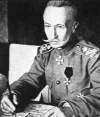
West of Halicz the detachments occupying the village of Bludniki retired, whereupon the enemy, profiting by this movement, occupied the place. The effort to win back this village was unsuccessful. According to supplementary reports received, on July 17th about 7 o'clock in the evening, when the enemy took the offensive and seized the height to the south of the village of Nowica (south of Kalusz), one of our regiments began to leave. Maj.-Gen. Prince Gagarin, commanding the Caucasian Native Horse Division, seeing the critical situation, at once moved forward a battalion of the Ukhnoff Regiment, placing himself at its head and disposing three of his regiments—the Daghestanians on the right, the Circassians and the Kabardians on the left. With a furious onslaught the Ukhnoff Regiment and the horsemen rushed forward, bearing also with them the Russian regiment which had retired. The general onslaught soon changed the situation in our favour. The advancing enemy fled in disorderly fashion, and our former position was restored. The brilliant work of the artillery of this command contributed decisively to the success.
1917 List Regiment: Gefreiter Adolf Hitler's 16th RIR remaindeployed for Phase 1 operations in Flanders, Belgium. [For further details, Click here.]
German Reichstag Peace Resolution:
As on August 1, 1914, so also now on the verge of a fourth year of war, the words of the speech from the throne still hold: "We are not impelled by the lust of conquest." Germany took up arms in defence of her freedom, her independence, and the integrity of her soil. The Reichstag strives for a peace of understanding and a lasting reconciliation of peoples. Any violations of territory, and political, economic, and financial persecutions are incompatible with such a peace. The Reichstag rejects any plan which proposes the imposition of economic barriers or the solidification of national hatreds after the war. The freedom of the seas must be maintained. . Economic peace alone will lead to the friendly association of peoples. The Reichstag will promote actively the creation of international organizations of justice. However, as long as the enemy governments refuse to agree to such a peace, as long as they threaten Germany and her allies with conquest and domination, so long will the German people stand united and unshaken, and they will fight until their right and that of their allies are made secure. Thus united, the German people remain unconquerable. The Reichstag feels that in this sentiment it is united with the men who have fought with courage to protect the Fatherland. The undying gratitude of our people goes out to them.
1918 List Regiment: (July 17-27):Gefreiter Adolf Hitler's 16th RIR spends a second-third day with the 23rd and First Guard divisions into the Marne valley. While German troops manage to gain some territory in the first three days, the French are well-prepared for a counter-attack (July 19), with the assist of 28,000 fresh American troops. [For further details, Click here.]
1919 Cenotaph is unveiled in London: On this day in 1919, the Cenotaph, a monument to those killed or wounded during the First World War, is unveiled in Whitehall, London, during the first Peace Day celebration.
Designed and built by Edwin Lutyens, at the request of Prime Minister David Lloyd George, the Cenotaph (literally "empty tomb" in Greek) was initially a wood and plaster construction created in less than two weeks. Inspired by the example of the French, who were planning their own similar celebration for July 14, 1919, Lloyd George envisioned the monument as one small part of a whole day of events commemorating the Allied victory in World War I, which had ended in an armistice the previous November. In early July, the prime minister formally commissioned Lutyens, who was forced to design and construct a monument to mark the endpoint of London s victory parade in less than two weeks.
Within an hour of the Cenotaph s unveiling on the morning of July 19, 1919, onlookers had piled wreaths of flowers high around its base. The parade that day included Allied military leaders such as Douglas Haig, the British commander in chief; Ferdinand Foch, the Allied supreme commander during the last year of the war; and John J. Pershing, head of the American Expeditionary Force (AEF) that served in World War I; along with some 15,000 Allied soldiers. In the florid words of the Morning Post newspaper: "Near the memorial there were moments of silence when the dead seemed very near, when one almost heard the passage of countless wings: were not the fallen gathering in their hosts to receive their comrades' salute and take their share in the triumph they had died to win?" . . . .
The current monument, cast in Portland Stone, was unveiled in 1920, with a simple inscription commemorating "The Glorious Dead." Each year, on the Sunday closest to November 11—Armistice, or Remembrance Day—a service is held at the Cenotaph in honor of British and Commonwealth servicemen and women who died during the two World Wars as well as later conflicts. Attended by the British royal family and political and religious leaders, as well as representatives from the armed forces, the service has not changed greatly since its introduction: it features the singing of hymns, an offering of prayers and the observation of two-minutes of silence, ending with a march of war veterans in a show of respect for their fallen countrymen.
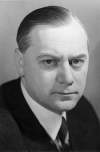
1935 Church and Reich: Alfred Rosenberg's latest book, Myth of the Twentieth Century, written as an answer to his critics in the Catholic Church, is put on the Church's Index of Forbidden Books. (THP)
We now realize that the central supreme values of the Roman and the Protestant Churches, being a negative Christianity, do not respond to our soul, that they hinder the organic powers of the peoples determined by their Nordic race, that they must give way to them, that they will have to be remodeled to conform to a Germanic Christendom. Therein lies the meaning of the present religious search.
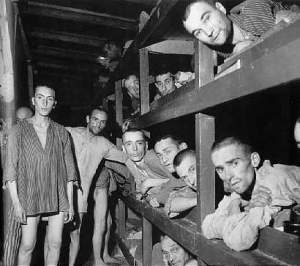
1937 Various:
Buchenwald: Ettersberg, a new concentration camp, originally designed for professional criminals, is opened in central Germany. Its name is changed to Buchenwald on July 28. (THP) (Note: Other sources say it was opened on July 16. Spurious sources somehow maintain it never opened at all.)
An excerpt from a Hitler speech in Munich, at the opening of a famous art museum designed by Professor Ludwig Troost:
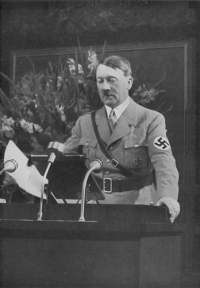
I would like to take this opportunity to state that I have made up my mind to put an end to meaningless phraseology in German art just as I did with confusion in politics. "Works of art" which cannot be understood, cannot speak for themselves but require a verbose set of instructions in order to find some shy creature who patiently listens to such stupid and brazen nonsense, will from now on no longer reach the German People.
All these catchy phrases such as "inner experience", "strong-minded", "a powerful desire", "feeling which is pregnant with the future", "heroic attitude", "significant intuitive powers", "inward experience of a system of time", "original primitivity" and so forth, all these stupid, fallacious excuses, phrases and meaningless formulations will not excuse or recommend products which are substandard and therefore without intrinsic value.
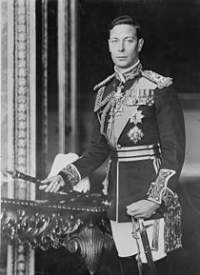
1938 King George VI of Britain pays a state visit to France.
1940 World War II: Various:
General Brooke replaces General Ironsides as the Commander in Chief, of British Home Forces.
Brooke returned to Britain and in July 1940 he replaced Edmund Ironsides as commander of the Home Forces. In this post Brooke had several major disagreements with Winston Churchill about military strategy. It therefore came as a surprise when Churchill appointed him Chief of Imperial Staff in December 1941.
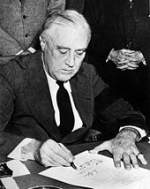
Roosevelt signs the Two-Ocean Navy Expansion Act.
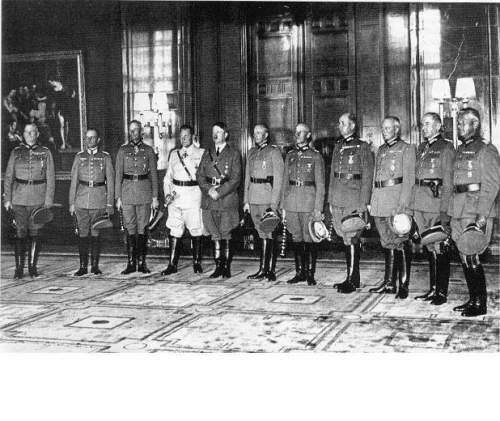
Hitler creates twelve new German field marshals in the wake of victory in the west. In a speech in the Reichstag, he issues what he describes as "a final appeal to common sense," urging that Britain make peace:
I have summoned you to this meeting in the midst of our tremendous struggle for the freedom and the future of the German nation. I have done so, firstly, because I considered it imperative to give our people an insight into the events, unique in history, that lie behind us, secondly, because I wished to express my gratitude to our magnificent soldiers, and thirdly, with the intention of appealing, once more and for the last time, to common sense in general.
War at Sea: The Royal Navy and the Regia Marina clash; the Italian light cruiser Bartolomeo Colleoni sinks, with 121 causalities.
1941 World War II: Barbarossa: In a major change of operational plans, Hitler issues Directive No. 33 ordering the German 4th Armee (von Kluge) and Panzergruppe 2 (Guderian) of Heeresgruppe Mitte (von Bock) to suspend their attacks toward Moscow and join 6th Armee (von Reichenau) and Panzergruppe 1 (von Kleist) of Heeresgruppe S=FCd (von Rundstedt) with the objective of destroying the Soviet Fifth, Sixth and Twelfth Armies W of the Dnepr-Dnestr line. The idea behind this directive is to begin exploiting the great agricultural and mineral riches of the Ukraine for the German war effort just as soon as the Soviet forces in that region are defeated. Both Kluge and Guderian object, but are curtly overruled by Hitler.
1942 World War II: Various:
War at Sea:German U-boats are withdrawn from positions off the US Atlantic coast because of increasingly effective American anti-submarine countermeasures:
Britain, as an ally to America, could now move some of her shipbuilding work to the safety of America's docks on the eastern seaboard. Britain's River-Class escort frigate was built in America and 25 Flower-Class corvettes were transferred to the United States Navy. While merchant shipping losses had been very high (1,299 ships in 1941 and 1,662 in 1942), America had started to produce her legendary Liberty and Victory ships in vast numbers. These ships could be escorted by the new River-Class frigates which could cross the whole Atlantic and remain with a convoy as a result. Faster than a surfaced U-boat, the River frigates, which could cross the whole Atlantic and remain with a convoy as a result. Faster than a surfaced U-boat, the River frigate posed a real problem to the U-boats. Equipped with H/F-D/F radar (Huff/Duff), they could 'see' U-boats on the surface at night and attack.
Barbarossa: In the East, the two-pronged German advance toward the Don bend and to Stalingrad beyond (6th Armee and 4th Panzerarmee) and toward Rostov (1 Panzerarmee) continues in the face of stiffening Soviet resistance.
Joseph Goebbels verbally attacks the Russians:
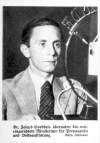
The hard and pitiless battle for Sevastapol, as well as the recent broad offensive operations of the German army, have reopened a lively debate, above all in the neutral press. Similar to that of the past winter, it is on the issue of the so-called Russian soul. The spiritual as well as the territorial boundaries between Asia and Europe have always interested Western Europeans. It is not to be denied that the ethnic mixture that we called Russia before 1917 and the Soviet Union thereafter has been a riddle to our part of the world. That had nothing to do with tsarism then or Bolshevism today. It simply has to do with the fact that the various peoples joined together in this monster of a nation are not a people in our sense of the word. (Die sogenannte russische Seele—Das eherne Herz (Munich: Zentralverlag der NSDAP, 1943), pp. 398-405.
1943 World War II: Various:
Rome is bombed for the second time:
On July 19, 1943, Rome was bombed again, more heavily, by 521 Allied planes, with three targets, causing hundreds of civilian casualties. After the raid, Pius XII, along with Msgr. Montini (future Pope Paul VI), travelled to the Basilica di San Lorenzo fuori le Mura, which had been badly damaged, and distributed ₤ 2 million to the crowds.
Between 11 a.m. and 12 noon, 150 Allied B17 Flying Fortresses attacked the San Lorenzo railway station and steel factory. The second target was the "Scalo del Littorio" on the northern side of Rome. The third target was the Ciampino airport, on south-east side of Rome.
[See: How Did the Pact of Steel Effect Germany and Italy?]Hitler and Mussolini meet at Feltre, a small hill town north of Venice:
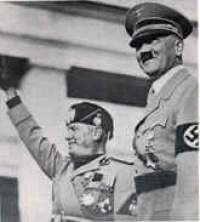
Mussolini again meets with Hitler in the Northern Italian town of Feltre. By now, Mussolini was very influenced by the stronger Hitler, and it was much to his discontent that this was the case. Members of Mussolini's party urged him to speak to Hitler about a possible way for Italy to exit the war, but Mussolini only asks for more military assistance. Hitler agrees, only if it is run under German authority. The tide had finally turned, Italy was now under the control of the German forces.
The Red Army begins a counter offensive at Kursk: From this point onwards, the German army is pushed back, despite desperate and bitter attacks and counter-attacks, as far as Germany and to defeat. (THP)
Sicily: the US Seventh Army (Patton) makes further progress toward Palermo, while the British Eighth Army (Montgomery) is held up before Catania by stubborn German resistance. The Red Army begins a counter offensive at Kursk. From this point onwards, the German army is pushed back, despite desperate and bitter attacks and counter-attacks, as far as Germany and to defeat. (THP)
1944 World War II: In the East, the Soviet 1st Ukrainian Front (Konev) encircles 5 German divisions west of Brody. In Italy, the US Fifth Army (Clark) captures Leghorn.
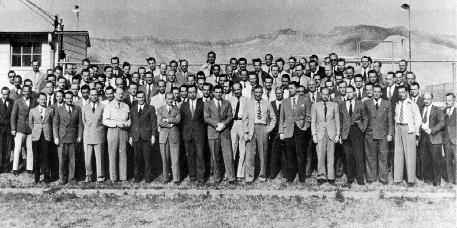
1945 The US JCS initiates a program detailing the handling of the Nazi scientists and their families. Labeled initially Operation Overcast, it will soon be renamed Operation Paperclip.
[For further details, Click here.]1946 Various:
Eduard Schulte, the man said to have first warned the West about the Holocaust, returns to Zurich from Germany. (THP)
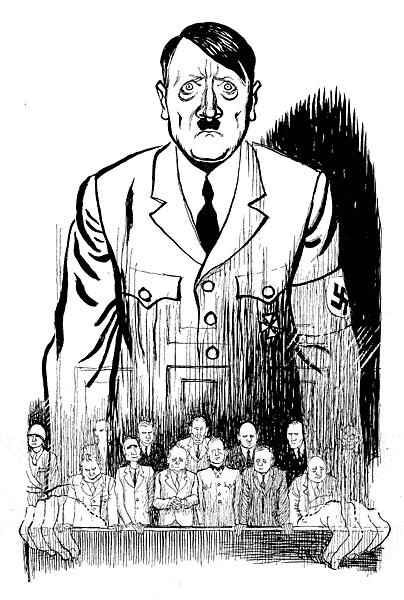
1946 Nuremberg Tribunal: Defense summations continue in the Major War Criminals Trial. One point in common with nearly all of the arguments of the various Defense Counsel is that there is a major absence among the Defendants; Adolf Hitler himself.
Professor Dr. Franz Exner (Counsel for Defendant Alfred Jodl):It will not be possible to understand Jodl's position or form a correct judgment of his actions if we do not visualize clearly the two men who here confronted each other. It is very easy for the Prosecution. Were Hitler still alive, he, as the head of the major war criminals, would sit in the first place on the defendants' bench and would be considered as the prime agent and source of all the terrible things that have happened. Now that he is dead, his person is belittled when judging the other defendants, and their conduct is treated almost as if he had never existed at all. This despot, this infernal power, as Jodl called him, cannot be passed over as a negligible quantity when the question is to judge justly the commissions and omissions of his immediate entourage. During these months I have again and again been reminded of the combination of genius, madness, and crime which was once depicted by the discerning Cesaro Lombroso. In history it is success that has the last word on the worth and worthlessness of man. Therefore, history's verdict on Hitler will perhaps be a crushing one. But one must not forget his beginnings; when one compares Germany's position toward the end of 1932 with that at the end of 1938, one is not surprised at the incomparable prestige which he had at the very time when Jodl came into close contact with him.
Jodl now stood before this man. Jodl, an honest soldier, extraordinarily gifted, but never striving to be anything but a conscientious soldier; a sober realistic mind, ill-disposed toward all diplomacy, all political machinations, brought up in the ideals of the German officer corps-bravery, faithfulness, obedience-trained according to the 100-year-old tradition of the German General Staff, who knew only fulfillment of duty, selfless work, and ever more and more work.
That this man, working at Adolf Hitler's side, was bound to come under his influence is self-evident. One must consider the time at which this took place. There could of course be no relationship of mutual confidence, but Jodl was also not the man to submit without opposition. There were clashes and explosions enough. Jodl was regarded as the man who dared to oppose the Fuehrer more than anybody else. He could, as Kesselring reported, stand up against him with a curtness which at times reached the limits of what is militarily permissible. For this very reason I do not believe that it is merely the receiving and obeying of commands which can make us appreciate fully Jodl's behavior during these years. It was much more the wider conception of the fulfillment of duty: Complete devotion to that which had been assigned to him as his task at a critical time. One should realize and appreciate the situation in which Jodl found himself.-His country's struggle for existence, the demands of a war which was becoming increasingly horrible, and at the same time the views of his Supreme Commander which disregarded all traditions about what was permissible and not permissible in a war. It was quite clear that Jodl was bound to come into conflict-into conflict with Hitler and into conflict with himself.
Jodl, as a General Staff officer, may have felt himself bound in a similar way to support the orders of his Supreme Commander, even if doubts regarding their admissibility in international law may have assailed him here and there. But he considered himself bound by his office to draw up plans for war without examining whether and under what conditions they were carried out; he had to formulate and issue thousands of orders, even if he disagreed with some of them. Where neither remonstrances nor delaying tactics had any effect, he had to submit. As a General Staff officer he had a purely auxiliary function. That he might be doing wrong while fulfilling this function according to the best of his knowledge and conscience never even occurred to him.
On 20 November 1945, at the beginning of the Trial, the presiding judge stated that this Trial is of great importance for millions of people in the whole world. For this reason, he said, everybody participating in them has the solemn responsibility of fulfilling his duty without fear and without favor to anybody, and according to the principles of law and justice.
This duty was often an almost too heavy burden for the Defense Counsel, not because of the extent of the material for the Trial, not because of the abundance of new legal questions, but because things were revealed here which are so monstrous and abysmally degrading that a normal brain would reject even the possibility of their existence. In so saying I am not thinking of the prepared human skin, of the pieces of soap made out of human fat which were shown to us; I am not thinking of the systematic way in which millions of innocent people were tormented, tortured, beaten, shot, hanged, or gassed. No, I am thinking of the many touching individual pictures which have made the deepest impression on me personally and probably also on everyone else.
Once more, I hear the report of the village priest Mogon regarding the shooting of the hostages from Choisel Camp in Chateaubriant:
"My father, we have not your religious conviction, but we are united in the love for our native country. We wish to die so that the French people will be happier."
I visualize the march of the Jews from Dubno which slowly approaches the place of execution, how the individual victims help each other to undress, how the little boy persuades his parents to die bravely, and how they carry an old woman whose lameness prevents her from taking the few steps to the pit where the deadly bullet from the submachine gun awaits her. I once more hear the testimony of the French journalist, Marie Claude Vaillant-Couturier, who describes in deeply touching words how the sacred experiences of maternity and female honor were shamelessly trampled under foot in the extermination camp.
Auschwitz alone has swallowed up 3 1/2 million people-men, women, and children. That is really the most terrible weapon of the Indictment, that the spirits of all these innocent victims stand beside the prosecutor, admonishing and demanding revenge. But I do not stand alone, either. The many innocent war victims on the German side, women and children who have fallen victim to the terror attacks which violated international law, in Freiburg, in Cologne, in Dresden, in Hamburg, Berlin, and Vienna, and in almost all other German cities, stand beside me. My comrades from the Armed Forces, who, as honest and decent soldiers, have sacrificed their lives for the fatherland by the hundred thousand, young and old, faithful to their Oath of allegiance, also stand by my side.
But even if they did not exist, if the defendant stood quite alone before his judges, then even more is it my sworn duty as a lawyer to stand helpfully by his side and be his shield and defense, and, faced with the mass of the most terrible, incriminating documents, to call to you, Honorable Judges: Do not judge in wrath, but as our Austrian poet Wildgans, who was a judge himself, wrote in the album of a young judge: "Suche das Edelreis, das unter Dornen blueht..." (Seek the precious shoot which grows among the thorns).
1951 Wunderwaffen: From the FBI Files of Wernher Von Braun, Hitler's former chief rocket scientist who is now working for the US:
Von Braun and his wife have applied for their first citizenship papers and he stated they were looking forward to becoming American citizens. As previously stated, he has purchased a home in Huntsville, and mentioned that his plans at the present time are to reside in Huntsville, Alabama. (HAL) [See: Wunderwaffen: Hitler's Deception and the History of Rocketry.]
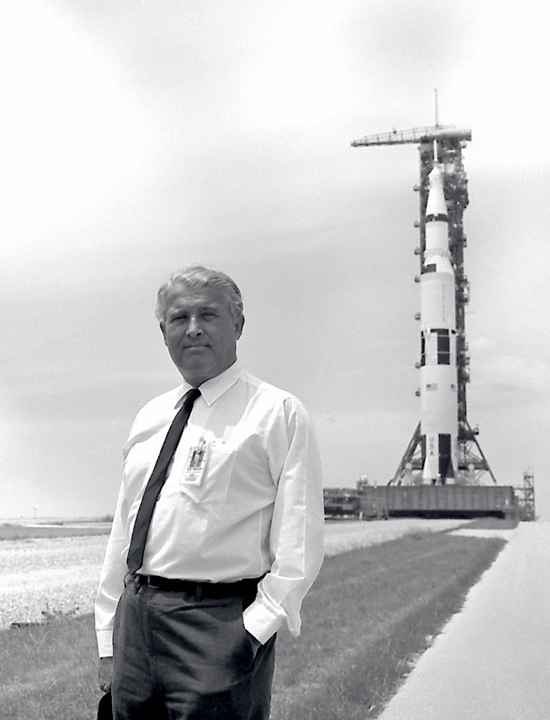
1969 Wunderwaffen: One day before the launch of Apollo 11, Life Magazine sponsors a pre-launch party for the rich, famous, and powerful, at the Royal Oak Country Club near Cocoa Beach. When Life's publisher introduces Wernher Von Braun, he receives a standing ovation from the assembled big shots. An excerpt from his remarks:
What we are seeking in tomorrow's trip is indeed the future on earth. We are expanding the mind of man. We are extending this God-given brain and these God-given hands to their outermost limits and, in doing so, all mankind will benefit. All mankind will reap the harvest . . . . What we will have attained when Neal Armstrong steps down upon the moon is a completely new step in the evolution of man.
NASA administrator Thomas O. Paine, as quoted in Prescription For Disaster by Joseph J. Trent:I think most people felt that he [von Braun] had a damned unfortunate past, and nobody liked a Nazi ... but that he had kind of paid his dues, and that he really helped us get to the moon in developing the Saturn V, and showed himself to be a worthy citizen of this country, and that while we won't exactly forgive and forget, politeness dictates, at least, we won't get into a disgraceful knock down and drag out.
Edited by Levi Bookin (Copy editor)
levi.bookin@gmail.com



Click to join 3rdReichStudies



Disclaimer: This site includes diverse and controversial materials—such as excerpts from the writings of racists and anti-Semites—so that its readers can learn the nature and extent of hate and anti-Semitic discourse. It is our sincere belief that only the informed citizen can prevail over the ignorance of Racialist "thought." Far from approving these writings, this site condemns racism in all of its forms and manifestations.
Fair Use Notice: This site may contain copyrighted material the use of which has not always been specifically authorized by the copyright owner. We are making such material available in our efforts to advance understanding of historical, political, human rights, economic, democracy, scientific, environmental, and social justice issues, etc. We believe this constitutes a "fair use" of any such copyrighted material as provided for in section 107 of the US Copyright Law. In accordance with Title 17 U.S.C. Section 107, the material on this site is distributed without profit to those who have expressed a prior interest in receiving the included information for research and educational purposes. If you wish to use copyrighted material from this site for purposes of your own that go beyond 'fair use', you must obtain permission from the copyright owner.
Please Note: The list-owner and moderators of 3rdReichStudies are not responsible for, and do not necessarily approve of, the random ads placed on our pages by our web server. They are, unfortunately, the price one pays for a 'free' website.